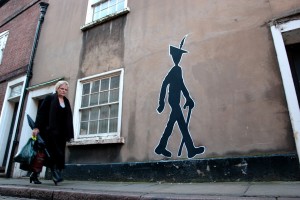 An article at Yes! Magazine traces some pop-cultural coordinates around the always-evolving Robin Hood myth. Written by Paul Buhle, the somewhat meandering article is based on his recently published book, Robin Hood: People’s Outlaw and Forest Hero (2011, PM Press). Buhle says the saga’s staying-power stems from it being “wrapped up simultaneously in class conflict (or something very much like class conflict), the rights of citizenship, and defense of ecological systems against devastation.” In both film and fiction, Robin Hood becomes a defender of the commons, a vigilante redistributor of income, a romantic, and a number of other recurring motifs. As long as economic injustice persists and as long as commons (new and old) remain threatened, argues Buehl, the Robin Hood myth will continue to be recreated and redefined for new eras. One of the things that interest me most about Robin Hood type figures is not so much the economic implications of their activities (strictly speaking), but rather what outlaws show us about the cultural politics of the law; that is, they expose the brittle hegemony of the law itself. Taken from this perspective, it’s telling that Robin Hood’s main adversary is not the landed aristocrat, but the Sherriff.
An article at Yes! Magazine traces some pop-cultural coordinates around the always-evolving Robin Hood myth. Written by Paul Buhle, the somewhat meandering article is based on his recently published book, Robin Hood: People’s Outlaw and Forest Hero (2011, PM Press). Buhle says the saga’s staying-power stems from it being “wrapped up simultaneously in class conflict (or something very much like class conflict), the rights of citizenship, and defense of ecological systems against devastation.” In both film and fiction, Robin Hood becomes a defender of the commons, a vigilante redistributor of income, a romantic, and a number of other recurring motifs. As long as economic injustice persists and as long as commons (new and old) remain threatened, argues Buehl, the Robin Hood myth will continue to be recreated and redefined for new eras. One of the things that interest me most about Robin Hood type figures is not so much the economic implications of their activities (strictly speaking), but rather what outlaws show us about the cultural politics of the law; that is, they expose the brittle hegemony of the law itself. Taken from this perspective, it’s telling that Robin Hood’s main adversary is not the landed aristocrat, but the Sherriff.
My interest in poachers, pirates, and bandits as social criminals rests on the tricky cultural politics of outlaws along with the traditional environments and spaces within which such figures are situated. Outlaws open up the field of political possibility, while at the same time producing discursive fodder for draconian politics. E.P. Thompson’s classic Whigs and Hunters is a perfect example of this slippery dynamic; Foucault’s Discipline and Punish also discusses similar tendencies. Maybe what intrigues popular culture isn’t so much Robin Hood’s robbing from the rich to give to the poor, but rather his inversion of social order through the flaunting of the law itself.
In film, my favorite Robin Hood adaptation is the brilliant 1978 Jamaican reggae classic Rockers.
